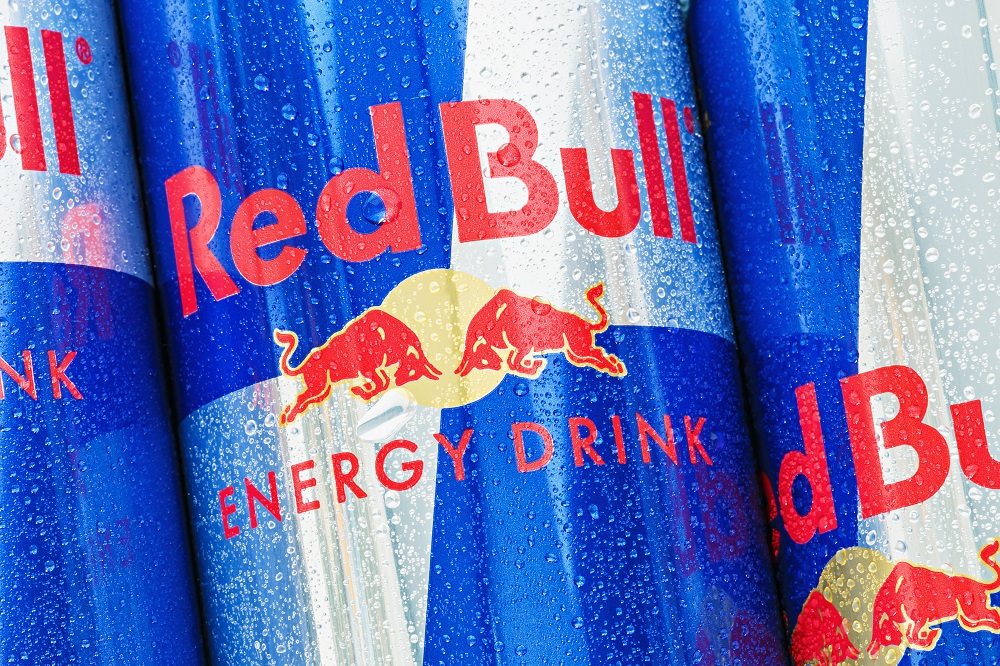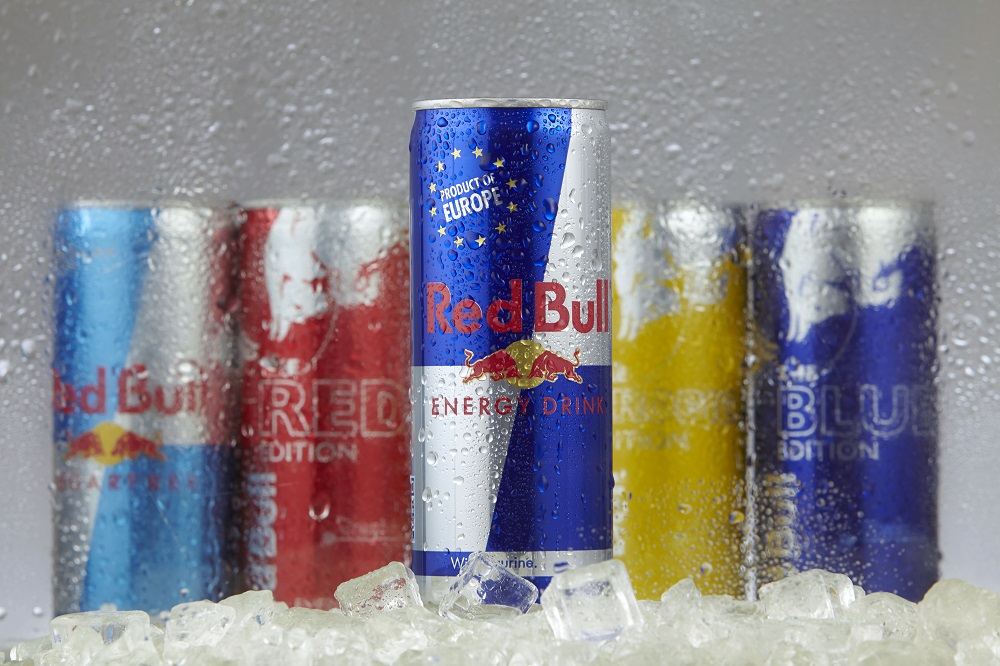Red Bull is a highly popular brand of energy drink characterized by their recognizable logo, two red bulls charging at each other against a yellow sun. The energy drink is consumed all over the world and holds the largest market share in the energy drink sector, holding 43% of the market in 2020 (1). Red Bull is especially marketed towards certain demographics as their website states that the beverage is enjoyed worldwide by “top athletes, busy professionals, college students, and travelers on long journeys (2).”
For most vegans, Red Bull is dietarily fine as it does not contain any obvious animal products or derivatives in its ingredients list. However, there are some ingredients that some vegans might be worried about such as sucrose and natural flavors. Furthermore, some Red Bull flavors also use synthetic food dyes which are also problematic for some vegans.

Since Red Bull does not contain any obvious animal products or by-products, it is considered vegan friendly.
However, there are some ingredients in Red Bull that will be discussed below that may be of some concern to some vegans. These ingredients include sucrose, natural flavors, and synthetic food dyes.
Note: While the ingredients above are found in a standard can of Red Bull, Red Bull specifically markets/caters to the vegan community through their "Organics by Red Bull" product line. Ingredients like "Natural flavors" which are often labeled with a vague description are labeled as being "sourced from plants." The same can be said about the sugar content which is noted as being sourced from beets as apposed to sugar-cane (3).
The list of ingredients in a standard can of Red Bull includes: carbonated water, sucrose, glucose, citric acid, sodium bicarbonate, magnesium carbonate, caffeine, niacinamide, calcium pantothenate, pyridoxine HCl, vitamin B12, natural and artificial flavors, colors.
A can of Red Bull contains many different vitamins, namely niacinamide (vitamin B3), calcium pantothenate (vitamin B5), pyridoxine HCl (vitamin B6), and vitamin B12.
There are several flavors listed on their website (e.g., Red Bull Sugarfree, Red Bull Zero, Red Bull Coconut Edition, etc.), each with slight variations in the ingredients list.
While there are no obvious animal products or derivatives in the ingredients list, there are some ingredients there that might concern some vegans, especially natural flavors and sucrose. Other flavors also contain synthetic food color additives such as Blue 1 in the Red Bull Blue Edition (Blueberry) and Red Bull Green Edition (Kiwi).
Natural flavors are a common ingredient found in many food items and beverages that help provide a product with a distinct flavor. However, this ingredient is problematic for some vegans as the FDA defines this ingredient quite ambiguously. Specifically, the FDA defines natural flavors as:
“The essential oil, oleoresin, essence or extractive, protein hydrolysate, distillate, or any product of roasting, heating or enzymolysis, which contains the flavoring constituents derived from a spice, fruit or fruit juice, vegetable or vegetable juice, edible yeast, herb, bark, bud, root, leaf or similar plant material, meat, seafood, poultry, eggs, dairy products, or fermentation products thereof, whose significant function in food is flavoring rather than nutritional (4).”
The vague definition of natural flavors simply means that the flavors are derived from a natural source, unlike “artificial flavors.” However, this also means that there is no way to determine whether natural flavors are produced using plant products or animal products unless you contact the company.
Sucrose is a common term used in the beverage industry to denote sugar. While sugar is conventionally derived from sugar-cane (Saccharum spp.) which is a plant source, there are production processes that can render sugar non-vegan.
Many sugar companies process their sugar to make them more appealing to a wider market demographic, particularly by making the sugar finer and white. To make sugar this way, they have to add extra refinement processes that involve a filtration step.
Different sugar companies can use different filtration protocols such as the use of granulated carbon, but some companies use bone char – the ground and charred bones of various animals(namely cattle). This means that sugar produced using bone char can no longer be considered vegan as its production process involved an animal by-product.
Unfortunately, it is difficult to determine whether the sugar a company makes uses bone char or not. Due to this uncertainty, many vegans prefer to avoid products with processed sugar at all. However, vegans from other parts of the world are more comfortable with sugar since the practice of using bone char is more common in the US than it is elsewhere.

Many companies add food coloring agents to their products for aesthetic appeal and as a way to distinguish different products in a similar line (i.e., such as different flavors). The original Red Bull and many other variants list “colors” in their ingredients list which means that the colors added are exempt from FDA certification as they are naturally sourced and safe.
This means terms such as “artificial colors,” “color added,” and other similarly worded phrases are vegan (5).
However, there are some Red Bull flavors that use synthetic food color additives such as the use of Blue 1 in the Red Bull Blue Edition (Blueberry) and Red Bull Green Edition (Kiwi). While Blue 1 does not use any animal products in its synthesis, many vegans avoid synthetic food coloring agents such as Blue 1 because they are extensively subjected to numerous animal testing studies.
Blue 1 in particular has been used on mice, rats, rabbits, dogs, and cats (6).
Many people believe that animal testing is an unethical practice, especially in the modern day as there are other research methods that could sufficiently replace the use of animal models such as in vitro assays (i.e., the use of cell models) and in silico studies (i.e., the use of computer modeling and algorithms).
Energy drinks like Red Bull have been surrounded by controversy as to whether or not they are safe to consume. Red Bull contains two ingredients that are of concern: sugar and caffeine.
According to the USDA FoodData database (7), an 8.4 oz can of Red Bull contains a total of 26.4 grams of sugar. This value is a total of all sugars present in the beverage such as sucrose (13.4 grams), glucose (8.77 grams), and fructose (4.2 grams).
26.4g of sugar in a 8.4 oz approaches the safe limit for daily sugar intake. The American Heart Association recommends that people should limit their daily sugar intake to 24-36 grams (8). Exceeding this amount can lead to severe health consequences such as obesity and heart diseases.
Caffeine is also an ingredient to be concerned with. According to the same database, an 8.4 oz can of Red Bull contains 74.8 milligrams of caffeine.
Studies recommend that people can consume ~400 milligrams of caffeine a day without experiencing any adverse health effects (9). While an 8.4 oz can of Red Bull might not surpass this daily limit, the limit is easily reached through the consumption of other caffeine-containing beverages on the same day such as coffee, tea, and soda.
References
3. https://www.organicsbyredbull.com/
4. https://www.accessdata.fda.gov/
